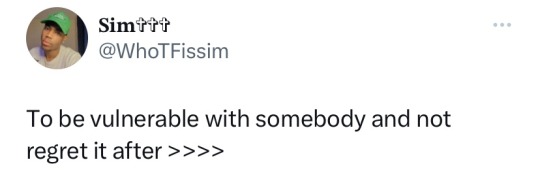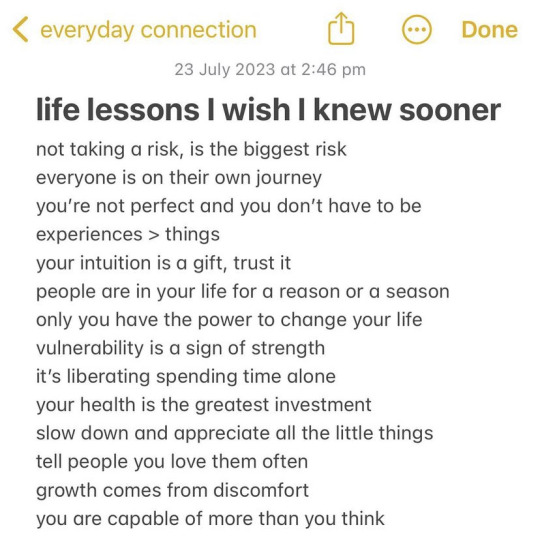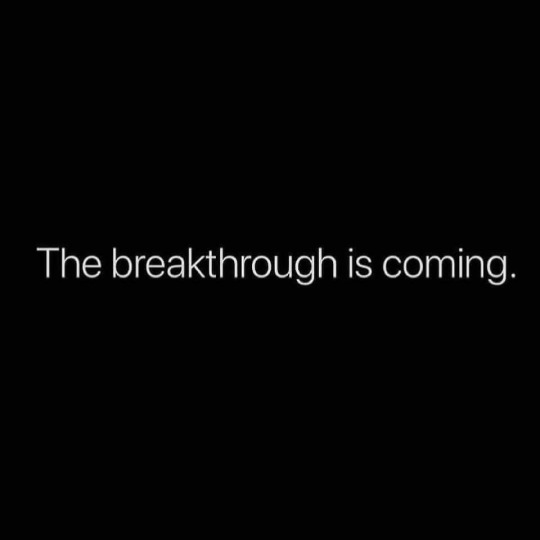A free space that I like to use to express my thoughts and feelings.Something I don’t do often enjoy:
Don't wanna be here? Send us removal request.
Text










ALL 2024.
CLAIMING IT NOW.
IT IS YOURS.
✨✨✨✨✨✨✨✨
Don’t miss out the game-changing content that we post on Instagram! Follow us now: TheBlackFeminineSociety
16K notes
·
View notes
Text

Change can sometimes be for the better. Change isn’t bad sometimes that is all we need to get our drive and focus back.
#changeyourattitude#loveyourself#personal growth#self empowerment#2023#high value mindset#positivethinking#know your worth#stay motivated#level up journey#levelup
1 note
·
View note
Text
Triggers✨✨✨
Triggers can come in many shapes and sizes. Triggers are a form of trauma to where you get a feeling or even a flashback about something that triggered you. Some examples of triggers can be yelling, screaming, arguing, or even a form of touch. It can be emotionally, physically, mentally, verbally, or even sexually. For example one of the triggers is touching. Sometimes I hate it when a person touches me. I am not really a person that likes to be hugged but I will give hugs when I feel like it. Another one is yelling I absolutely hate it when someone yells at me. It will make me want to cry if I hear you yelling at someone or even if you are yelling at me.
#triggers#triggers are real#personal growth#loveyourself#self empowerment#focus on self#mindset#positive message#positivethinking
0 notes
Text
Brainwash yourself with good habits. You need to do it the way you would train a dog - fetch the stick and get a treat.
I love listening to music but I also wanted to start listening to podcasts. I have to go to work everyday, and I prefer to drive myself to work and back.
I know that if I make myself listen to podcasts both drives, the habit will last not more than 3 days.
But if I make myself listen to a podcast on the way to work; and listen to my favourite music on the way back home to de-stress and relax; now that’s a healthy compromise. And it works for the long term.
The same goes with social media. I deleted all social media from my phone. I don’t have Facebook, Instagram, or even tumblr on my phone. The YouTube account that I keep on my phone has been very consciously kept; I only allow the algorithm to show me educational stuff like podcasts, history videos, news, psychology, stuff like that. Absolutely no entertainment. I keep all my social media (and my “fun” YouTube account which is basically Korean mukbangs and all sorts of useless beauty hauls that I honestly love to watch) on another device - my iPad, which I use for work. I check out what’s happening on tumblr or YouTube or Pinterest when it’s my lunch break or a coffee break. That’s another healthy compromise that works for me.
Going cold turkey with anything - stopping something addictive like smoking or drinking or suddenly starting a plethora of new habits- doesn’t work. You’ve restricted your mind and body so much that you keep remember the good old days where you drank like a whale and sat on the couch watching rubbish and you glamorise, romanticise and reminisce those times. Now you’re in that dangerous red zone where you know that if you see that bottle or the packet of chips, your body is going to reach for it before your mind can intervene.
Aim for long-term, sustainable albeit small habits, rather than complex overnight habits.
2K notes
·
View notes
Text
Love this. Does anyone want to give this a try?
These are the things I do for MY own health. Emotionally, mental and physical. These habits were incorporated in my life little by little, not all at once, and are now part of my lifestyle. This post is basically a reference or suggestions for anyone who is interested, not me telling you that you have to do all of these things.
Pilates and light weight work outs 30-45 minutes daily.
10k Steps daily.
Eat the designated amount of nutritional intake for my body daily.
1 Gallon of water daily.
Morning and evening skincare routine.
1 Facial a week.
1-2 hours of reading daily (mostly audible).
Meditate in the morning.
Communicate my feelings about any given situation.
Sleep with silk gowns and a silk pillow.
Spearmint tea 2 times a day for hormone regulation.
Create a to do list daily.
1 hour of learning something new.
Scroll social media for 1 hour max - I have a timer on my phone that disables apps.
Remove anyone who stresses me out.
Massage 1 a week.
Dress up every day even when i'm working from home.
Treat myself to something when I accomplish small goals.
Take supplements daily.
Journal my feelings.
#loveyourself#personal growth#self empowerment#2023#high value mindset#positivethinking#know your worth#stay motivated#level up journey#levelup
4K notes
·
View notes
Text

In this new month we will succeed. Everything that we want and dream for will happen.
1 note
·
View note
Text
Sometimes you need to change your mindset. All of these things are great ways to start off.
Cognitive Techniques To Change Your Thoughts ✨✨
Cognitive techniques are strategies used in cognitive therapy to help you identify and change negative thoughts and beliefs. These techniques should be practiced regularly so that they become habits.
Cognitive Restructuring: This involves identifying and challenging negative or irrational thoughts and replacing them with more positive or rational beliefs.
Thought Stopping: When you notice a negative thought entering your mind, you can mentally shout "Stop!" This interrupts the thought process and gives you a chance to replace the negative thought with a positive one.
Mindfulness and Meditation: These practices help you become more aware of your thoughts and feelings in the present moment. When you observe your thoughts without judgment, you gain insight into negative patterns and choose to let them go.
Journaling: Writing down your thoughts can help you process and analyze them. With time you can identify patterns and work on changing negative thought cycles.
Positive Affirmations: Repeating positive statements can help counteract negative self talk and reinforce positive beliefs about yourself.
Evidence Collection: When faced with a negative belief, ask yourself, "What evidence do I have that supports or refutes this thought?" This can help you see things in a more balanced way.
Decatastrophizing: If you tend to imagine the worst scenario, ask yourself how likely it is to happen and what other possible outcomes there might be. This can help you view situations more realistically.
Labeling: Instead of saying "I am a failure," label the thought as "a negative thought about my abilities."
Distraction: Engaging in an activity or hobby can divert your attention from negative thoughts and give your mind a break.
Scheduling Worry Time: Instead of ruminating on worries throughout the day, set aside a specific time to process them. This can prevent constant worry and allow you to focus on other tasks.
Challenging Cognitive Distortions: Recognize and challenge cognitive distortions like black-and-white thinking, overgeneralization, and personalization.
Visual Imagery: Visualize a place or situation where you feel calm and happy. This can help shift your focus from negative thoughts.
These are very simple descriptions and examples of cognitive techniques. I listed the ones we can put into practice on our own. There are more in depth methods and practices used by doctors on different fields of study and practice. I can list, as well as add upon the information listed here.
5K notes
·
View notes
Text
All things that we can control but there are some things that are just out of our reach.
Things You Can Control ✨✨
How you respond to others and situations.
Where you spend your time and who with.
The shows, books, news and social media you consume.
What you do with your free time.
What you say to others.
What you think about.
How hard you try.
What you allow or don't allow from others.
Good or bad routines you follow.
What you aim for in life.
Being positive or negative.
Eating, exercising, and resting.
Learning new skills or knowledge.
Who you hang out with.
What you buy and spend on.
Keeping your space clean or messy.
What fun activities you pick up.
Saying "thank you" and feeling thankful.
Knowing when to say "no" or "enough".
What you hope for and dream about.
Doing nice things for others.
Picking one thing over another.
What's most important to you.
What you do every day.
What you feel is true or right.
Taking time for yourself.
6K notes
·
View notes
Text
Giving Up Something
Sometimes we need to give up certain things an order for us to grow. Giving up something could be a variety of things. We might need to give up sugary or fried foods so that we can prevent ovurselves from having hypertension or diabetes. Sometimes we need to give up a boyfriend or girlfriend who is too controlling. There are so many things that we might need to give up. One we give them up we might fee bad in that moment but, know that something better is waiting for you.
1 note
·
View note
Text

26K notes
·
View notes
Text

20K notes
·
View notes
Text
How to Stop Procrastinating by Managing Your Emotions
Procrastination happens when we delay doing things, and it's often connected to our emotions. Feelings like being afraid to fail, feeling worried or stressed, getting bored, or lacking motivation can all contribute to procrastination. To stop procrastinating and get more things done, it's important to learn how to handle our emotions better.
Boredom:
Break the task into smaller, more engaging sub-tasks.
Find ways to make the task more interesting or challenging.
Set a timer and work on the task for a specific amount of time, followed by a short break doing something enjoyable.
Feeling Overwhelmed:
Prioritize tasks and focus on one thing at a time.
Break the task into smaller, more manageable steps.
Delegate some parts of the task if possible or seek help from others.
Use tools like to-do lists or task management apps to stay organized.
Anxiety:
Practice deep breathing or mindfulness techniques to calm yourself.
Challenge negative thoughts and replace them with more positive and realistic ones.
Start with the easier or less intimidating aspects of the task to build momentum.
Set realistic expectations and remind yourself that it's okay to make mistakes.
Self-Doubt:
Focus on past accomplishments and successes to boost your confidence.
Seek support or feedback from others to gain reassurance.
Remind yourself of your skills and capabilities to tackle the task.
Use positive affirmations to counteract negative self-talk.
Perfectionism:
Embrace the concept of "good enough" rather than seeking perfection.
Set realistic and achievable goals for each task.
Recognize that mistakes and imperfections are part of the learning process and growth.
Indecisiveness:
Break decisions into smaller steps and make one small decision at a time.
Set a time limit for making decisions to avoid overthinking.
Trust your instincts and make the best decision you can with the information available.
Apathy or Lack of Interest:
Find aspects of the task that align with your values or long-term goals.
Break the task into smaller, more manageable parts and focus on completing one at a time.
Reward yourself for completing the task to make it more appealing.
Stress or Burnout:
Practice stress-reduction techniques such as meditation, exercise, or spending time in nature.
Break tasks into smaller steps to reduce the feeling of overwhelm.
Prioritize self-care and take breaks to avoid burnout.
Feeling Uninspired or Creatively Blocked:
Engage in activities that stimulate creativity, such as brainstorming, mind mapping, or seeking inspiration from others' work.
Start with a simple and basic version of the task to get the creative juices flowing.
Collaborate with others or seek feedback to gain new perspectives.
Fear of Success:
Identify and challenge the negative beliefs or fears that may be holding you back.
Visualize the positive outcomes of completing the task successfully.
Focus on the benefits and personal growth that come with success.
Impatience:
Break long-term goals into smaller milestones to track progress.
Practice mindfulness to stay present and patient throughout the process.
Remind yourself that progress takes time and effort.
Lack of Confidence:
Celebrate your past accomplishments to boost your confidence.
Seek support and encouragement from friends, family, or mentors.
Focus on building specific skills related to the task to increase confidence.
Avoiding Discomfort:
Acknowledge that discomfort is a natural part of growth and improvement.
Break tasks into smaller steps and tackle the more challenging aspects gradually.
Remind yourself of the long-term benefits of facing discomfort.
Overestimating Future Motivation:
Practice discipline and commit to starting tasks even when motivation is low.
Set specific deadlines for tasks to create a sense of urgency.
Establish a routine that includes regular work on the task to build consistency.
9K notes
·
View notes
Text

7K notes
·
View notes













